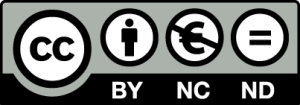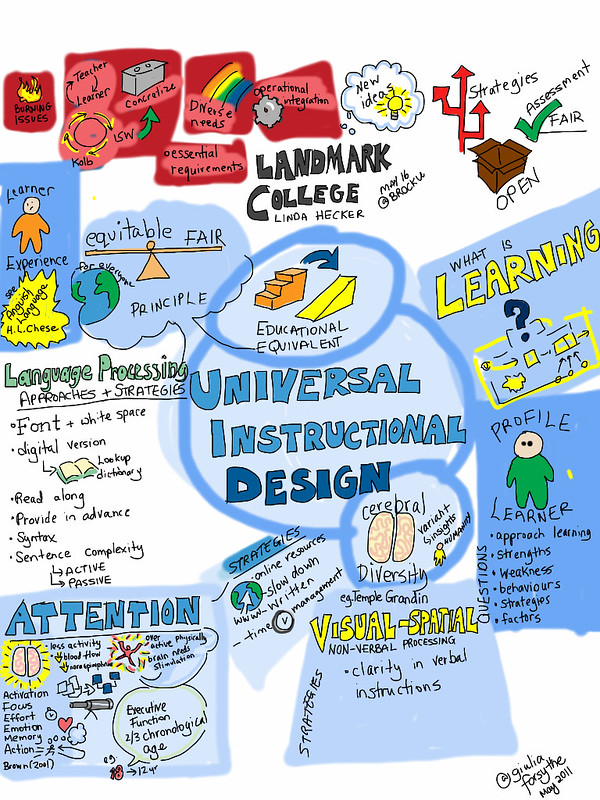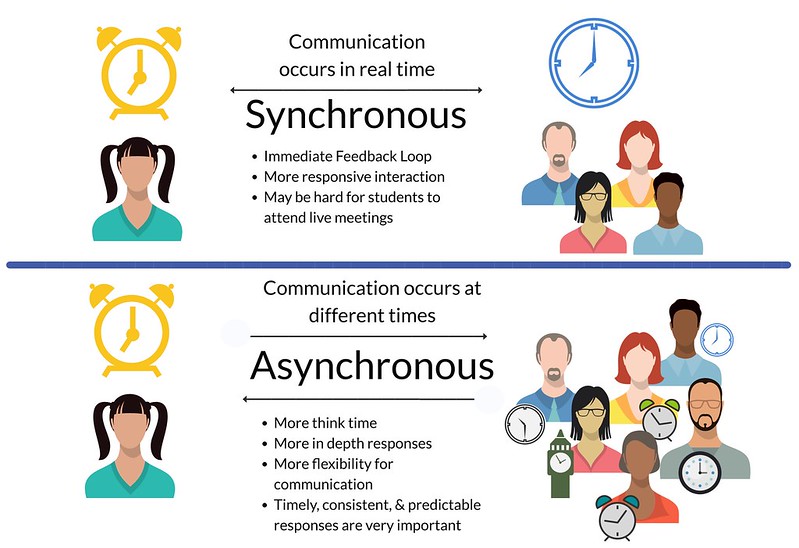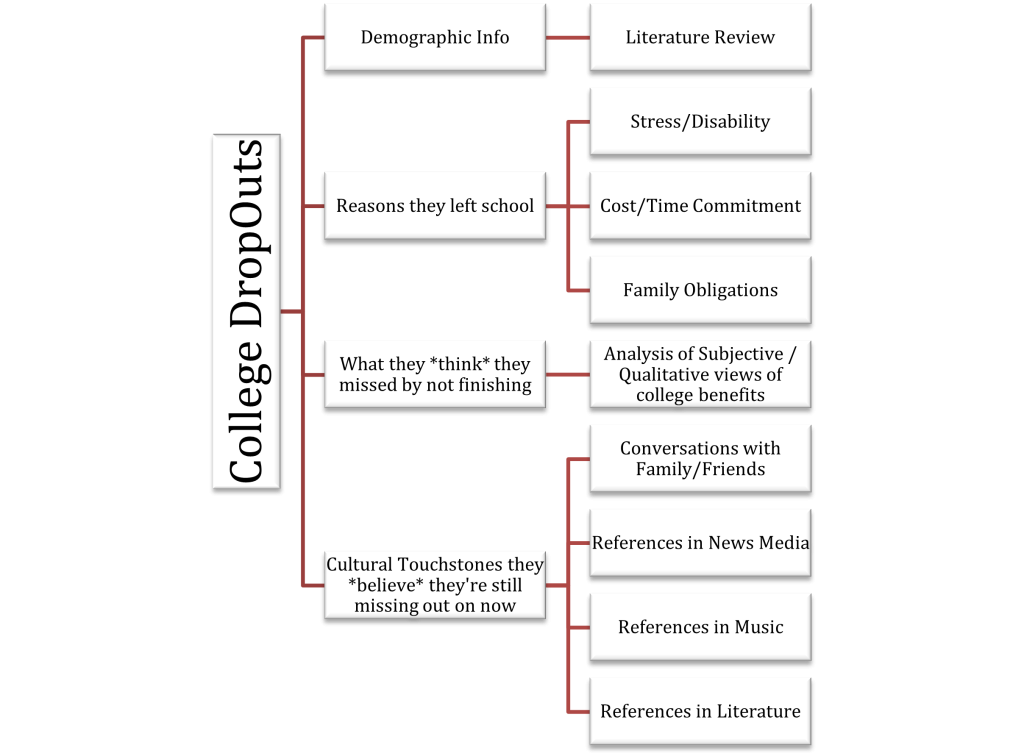Course Title
In response to the oft-asked media question “Is College Worth It” – I plan to examine the question with both academic and decidedly non-academic research on the subject. The discussion of college benefits in the media has been mostly focused on ROI (return on investment), basically, highlighting the fact that degree holders from many disciplines tend to out-earn their non-graduate counterparts.
Money isn’t everything. This project will focus instead on soft skills, cultural perceptions, and other intangible issues that remain top of mind for college dropouts impacting their self-esteem. It will feature cheeky, snarky videos like “what you missed from college (or didn’t miss actually)”. A combination of sour grapes and insights, delivered in an online/micro/adult learning format with simple assessments.

The project will explore stigma, and knowledge gaps, real or imagined, it will also highlight many micro-learning opportunities available intended to bridge the perceived gaps in knowledge and boost confidence in those who did not or could not persist through four years of higher education.
It will also highlight public figures who despite graduating from elite colleges have become failures.

After spending time online, it seems there is a very large community of frustrated former college students to tap into for survey and participation – SubReddit r/collegedropouts and similar.
Research shows most former students still want to complete their degrees and many (if not all) feel the sting of lifelong stigma for not having finished what they started in higher education. The course will assure them that it’s never too late with examples.

Participants will probably have a high school degree or equivalent and be well versed in the topic areas covered in the micro-course from both high school and experience registering for college gen eds.
Also, these students will need to be both intrinsically motivated and seeking some solace about their position relative to college graduates.
Again, the course will poke fun at college while offering a humourous survey-style video course about what is typically learned there and why.
The course will be for entertainment and information purposes only.
TLDR: School will be a non-serious / non-academic and distinctly humourous look at higher education and highlights from a few common academic disciples as they notably relate to popular culture.

ASYNCHRONOUS ONLINE DELIVERY
Course will be self-paced and not require users to log in unless they want to add to discussion boards
The course will be a series of short videos followed by fairly easy quizzes and interactive content that will be automatically graded.
| Individual Modules | Course Outcome Alignment |
| 1· Time Management – aka ” not enough hours in the day “ 2· Financial Literacy – aka ” the math ain’t mathin’ [sic] “ 3· ROI – aka ” how capitalism killed college “ | ·Module One – Aligns with Course Outcome 1 ·ModuleTwo – Aligns with Course Outcome 1 ·Module Three – Aligns with Course Outcome 1 |
| Course Content |
| 1. Videos (featuring characters that will be established from the onset) 2. Short Subject Summaries (reading) 3. Interactive Quizzes (unlimited attempts) 4. Discussion Boards for self-reflection (ungraded and unmonitored) 5. Resources lists for alternative learning / affordable certificates, etc. |
| Subject Matter Expert/Resources |
| MEDIA AND INTERACTIVE RESOURCES – Video animations and scripts will be written and created by me. GENERAL EDUCATIONAL RESOURCES – General education subject overviews and content will come from open sources such as: · OER Commons – OER Commons. (2022). OER Commons. https://oercommons.org/ · Open Stax – OpenStax | Free Textbooks Online with No Catch. https://openstax.org/ · LibreTexts – LibreCommons. (2023). LibreCommons. https://commons.libretexts.org CRITICAL CONTENT RESOURCES – Surveys, media articles, and academic writing critical of higher ed such as this excellent book: · Rahman, S., Sunder, P., & Jackson, D. (2022). A People’s History of Structural Racism in Academia: From A(dministration of Justice) to Z(oology). Open Textbook Library. https://open.umn.edu/opentextbooks/textbooks/1282 DIGITAL MEDIA CHECKLIST FOR A People’s History of Structural Racism in Academia |
| Rapid Instructional Design Model |
| The minicourse TLDR; school with be developed using the most cost-effective and time-reducive management style because of the time and money limitations imposed on the project by its very nature (i.e. a few weeks to complete and the need to use free/open resources). One of the many weaknesses of this model (detailed in this post) are the case, for example, I am the SME, the developer, and the graphic designer on this project. One area of concern is the development steps that will undoubtedly suffer because of my one-person show, namely the inability to address diverse learner needs, the need to make the content accessible to a large audience, and the ability to timely respond to feedback. |
| Understanding by Design |
| Another important learning theory utilized for ILDR is UBD, created by Grant Wiggins and Jay McTighe, this framework is results-focused, as they say, “Begin with the End in Mind”. Stage 1 – UBD is ideally suited to be a guide to any curriculum planning that is working backward from a pre-determined outcome or big idea; because this project began with a goal – to increase the confidence and lifelong learning efforts of those who didn’t complete college. Stage 2 – UBD asks essential questions, and then determines how assessments can reveal understanding. The essential idea here, is college worth it, remains an open question. Stage 3 – The academic subject-specific content is not as important as the desired outcome, transferring a sense of motivation and confidence to self-educating and understanding how to find information over the long term if the participant is interested. |
This Microlearning course about College success (or the lack thereof) will primarily focus on storytelling. The target audience will certainly have their own stories about college difficulties and will be free to share them in the discussion. Importantly, the course will present an alternate narrative, one that attempts to explain what the hidden purpose(s) of college are (status-seeking), and how the rigor is designed for both noble and nefarious purposes.
In short, the Theory of college is not served by the Practice of attending college in the modern world and this course will attempt to explain why, intertwined with a superficial presentation of academic content. In other words, the course will primarily deliver visuals briefly and cheekily, but in so doing, explore the historical and social reasons for higher education’s inflexibility, and explain social gatekeeping, racism, and exclusivity, as the real additional aims of attaining a college education.

WHAT DOES TELEOLOGICAL [TEL] + [EE] + [UH] + [LOJ] + [I] + [KUHL] ) – MEAN?
Often, when we try to understand something, we ask questions like “What is it for?”. Knowing something’s purpose or end goal is commonly seen as integral to comprehending or constructing it. This is the practice or viewpoint of teleology. (THE ETHICS CENTRE, 2022)
WORKS CITED
Straniero, D. (2019, November 20). Where Your Money Goes, & Why – Darren Straniero, CFP® – Medium. Medium; Medium. https://medium.com/@darrenstraniero/where-your-money-goes-why-50b9994174b0
Frustrated Student: Image by PublicDomainPictures from Pixabay
Universal Instructional Design (Learner Profile) https://www.flickr.com/photos/gforsythe/5735534039 Attribution (CC BY 2.0)
Information by Nick Youngson CC BY-SA 3.0 Pix4free
“Synchronous_Asynchronous For Students _ Rabin Pamela _ Flickr.png” by Rabin Pamela, Modifications: Cropped to exclude top half is in the Public Domain, CC0
Storytelling Graphic [url=https://commons.wikimedia.org/wiki/File:Storytelling_a_voice_from_within_(6926263837).jpg][img]https://upload.wikimedia.org/wikipedia/commons/thumb/6/6e/Storytelling_a_voice_from_within_%286926263837%29.jpg/512px-Storytelling_a_voice_from_within_%286926263837%29.jpg[/img][/url]
[url=https://commons.wikimedia.org/wiki/File:Storytelling_a_voice_from_within_(6926263837).jpg]Storytelling a voice from within (6926263837)[/url]
Giulia Forsythe, CC0, via Wikimedia Commons
The Ethics Centre. (2022, April 4). What is teleology? – Ethics Explainer by The Ethics Centre. THE ETHICS CENTRE. https://ethics.org.au/teleology/#:~:text=Teleology%20comes%20from%20two%20Greek,and%20features%20that%20it%20does.
“Survey Concept Map” by Elaine Plourde is licensed under CC BY 4.0




